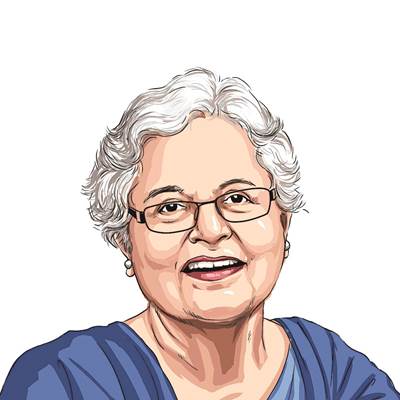Opinion The real pseudo-moderates
Perhaps the most memorable line in Justice Liberhan's very forgettable report is where he coins the phrase 'pseudo moderate'.
Perhaps the most memorable line in Justice M S Liberhan’s very forgettable commission report is where he coins the phrase “pseudo moderate”,to counter to L K Advani’s “pseudo secular” argument during his rath yatra campaign for the Ram temple. Both terms are particularly relevant in India,where the politics of wooing minorities has degenerated into tokenism and meaningless gestures. Grand speeches rather than genuine efforts for the development and progress of the minorities is the norm. The entire debate on secularism,communalism and moderation is replete with hypocrisy.
Justice Liberhan has a point when he dubs Advani ‘pseudo moderate’,though it is unfair to use the
Advani’s position is different. He openly appealed to religious sentiment during his much publicised Rath Yatra from Somnath to Ayodhya and made the issue of building a temple at the spot the theme of his fiery speeches. He was present when the kar sevaks were bringing down the mosque,which is why his subsequent tears and claim that it was the saddest day of his life,sound a little hollow. A shrewd politician should have known that if you sow the wind you can expect to reap a whirlwind.
Advani supporters try to make the point that his tussle with the RSS on the issue of declaring the founder of Pakistan,Mohammed Ali Jinnah secular,is a sign of his moderation. But,if Advani genuinely wanted to project a liberal image,he should have selected a more worthy cause. He could have displayed his disapproval over the Gujarat state government’s failure to protect Muslims in 2002 or protest against the attacks on Christians in Orissa.
For that matter,the man whose reputation he is so keen to protect,Jinnah,was not particularly secular but rather a “pseudo- communalist”. He aped the British in his life style and appreciated their liberal philosophy. He ignored Islamic teaching regarding liquor,food and social norms. But Jinnah also played on religious sentiments when he sniffed an opportunity to exploit the communal divide to further his personal political ambitions.
If Advani is a pseudo moderate,so too is Justice M S Liberhan. If the judge was genuinely exercised about the mosque demolition,he could have easily completed his job in six months,or a year at the most. Instead he dragged on the commission for 17 years,presumably simply so that he could enjoy the perks and salary that came with his position.
While using the strongest possible words to indict those he considered culpable for the crime,Liberhan strangely has not recommended penal action against any of those named. Nor has he has passed strictures against previous Congress Central governments who are also guilty to some degree.
In fact the sobriquet “pseudo moderate” could well be applied to both Rajiv Gandhi’s and Narasimha Rao’s governments. There was no call for the Rajiv Gandhi government to remove the locks on the Babri mosque in 1987 and open a can of worms ,which was bound to stoke communal passions. The mosque was sealed for nearly 40 years by a court order and opening it was simply a sop for the Hindu voters to balance striking down the Supreme Court judgment in the Shah Bano case in order to assuage orthodox Muslim sentiment. People now forget that long before the mosque was demolished,an informal shrine had already been installed under the roof of the mosque and there was a long queue of Hindu pilgrims daily. In effect a mandir was already in place.
The Congress,not just Narasimha Rao alone who is a convenient scapegoat,has therefore also to share part of the blame for subsequent series of events. It is also a failure of a succession of governments that even after 17 years no one has been convicted in a court of law on the demolition case. In fact,the cases could well drag on for another decade,by which time many of the principal accused will have passed away.
“Pseudo secularists”,”pseudo liberals “and “pseudo communalists” are those who believe that they can milk a situation to their advantage without any genuine concern for the people whose cause they claim to be espousing. It is unfortunate that in our country categorisation of people as communal or secular is decided on the basis of ones speeches,not one’s actions. The criteria is a person’s point of view on the common civil code,how the history of medieval India should be written,whether you are in favour of providing more Urdu schools,giving free travel for Haj,are agreeable to occasionally donning a Muslim prayer cap et al. And many politicians easily earn the secular label simply by pandering to orthodox elements in the Muslim community. A more genuine litmus test of secularism would be whether you are prepared to allow your daughter to marry a Muslim.
A truly secular politician is one who is concerned that minorities are not just secure but also that they are given equal opportunities in every sphere. I find it strange,for instance,that the same politicians who for years have raised the slogan of Babri Masjid and the Liberhan Commission to demonstrate their secular spirit,generally shy away from questioning the government on why the Ranganath Mishra Commission report has been put into cold storage for the last two years. The commission has recommended quotas to Muslims and Christians who fall within the Dalit category and fixing quotas for minorities in employment,in actuality far more meaningful measures for the community than anything the Liberhan Commission has to offer.





